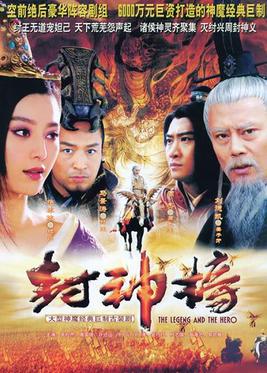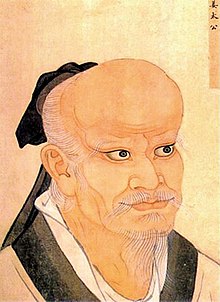
The Investiture of the Gods, also known by its Chinese names Fengshen Yanyi (Chinese: 封神演義; pinyin: Fēngshén Yǎnyì; Wade–Giles: Fêng1-shên2 Yan3-yi4; Jyutping: Fung1 San4 Jin2 Ji6) and Fengshen Bang (封神榜), is a 16th-century Chinese novel and one of the major vernacular Chinese works in the gods and demons (shenmo) genre written during the Ming dynasty (1368–1644). Consisting of 100 chapters, it was first published in book form between 1567 and 1619. Another source claims it was published in a finalized edition in 1605. The work combines elements of history, folklore, mythology, legends and fantasy.

Daji (Chinese: 妲己; pinyin: Dájǐ; Wade–Giles: Ta2-chi3; Jyutping: Taan2 Gei2) was the favourite consort of King Zhou of Shang, the last king of the Shang dynasty in ancient China. In legends and fictions, she is portrayed as a malevolent fox spirit who kills and impersonates the real Daji. Her identification as a fox spirit seems to have originated from at least the Tang dynasty. These accounts have been popularized in works such as the Wu Wang Fa Zhou Pinghua (武王伐紂平話), the Fengshen Yanyi, and the Lieguo Zhi. She is considered a classic example of how a beautiful femme fatale can cause the downfall of a dynasty in Chinese culture.
Yunzhongzi is a character from the famed classic Chinese novel Fengshen Yanyi.

Pipa Jing, or Wang Guiren, is a character featured within the classic Chinese novel Fengshen Yanyi. She is a yaojing transformed from a jade pipa after thousands of years of cultivation. She later becomes a favored concubine of King Zhou of Shang.
The Fang Brothers, Fang Bi and Fang Xiang, are two palace guards under King Zhou of the Shang dynasty featured within the famed classic Chinese novel Investiture of the Gods.

Bo Yikao was the eldest son of King Wen of Zhou and the elder brother of King Wu who was the founder of the Zhou dynasty of ancient China.

Wen Zhong is a character in the classic Chinese novel Fengshen Yanyi. He was the Grand Preceptor (Taishi) of King Zhou of Shang. Wen Zhong and Huang Feihu were both renowned as the two most powerful military figures of the Shang dynasty. They played a crucial role in defending the territories of these dynasties, almost single-handedly.

The Legend and the Hero was a 2007 Chinese television series adapted from the 16th-century novel Fengshen Yanyi written by Xu Zhonglin and Lu Xixing. The first season started airing on CCTV-8 in February 2007. It was followed by a sequel, The Legend and the Hero 2 in 2009.

The Legend and the Hero 2 is a Taiwanese television series adapted from the novel Fengshen Yanyi written by Xu Zhonglin and Lu Xixing. The series was first broadcast on TTV from September to October 2009, and was preceded by The Legend and the Hero in 2007.
The Investiture of the Gods is a Chinese shenmo television series directed by Wang Weiting and Yang Jianwu. The television series are based on the classical 16th-century novel Fengshen Yanyi written by Xu Zhonglin and Lu Xixing.
The Investiture of the Gods is a 1990 Chinese shenmo television series written by Bing Tian, Gu Hanchang, Ouyang Yuping and Yu Youchen. The television series are based on the classical 16th-century novel Fengshen Yanyi written by Xu Zhonglin and Lu Xixing.

Shen Gongbao (申公豹) is a major character featured within the famed classic Chinese novel Investiture of the Gods. Shen Gongbao is a disciple of Yuanshi Tianzun, Jiang Ziya's junior fellow apprentice.

League of Gods is a 2016 Hong Kong-Chinese fantasy film directed by Koan Hui, co-produced by Charles Heung and Wilson Yip, based on the 16th-century novel Investiture of the Gods by Xu Zhonglin and starring an ensemble cast of Jet Li, Tony Leung, Fan Bingbing, Louis Koo, Mark Huang, Angelababy, Wen Zhang, Andy On and Jacky Heung. The film was released in China on 29 July 2016.
Investiture of the Gods is a 2019 Chinese shenmo television series loosely based on the 16th-century Chinese gods and demons fiction Investiture of the Gods by Xu Zhonglin and Lu Xixing. The series is directed by Korean director Shin Woo-chul and starring Wang Likun, Luo Jin, Zhang Bo, Yu Hewei, Deng Lun, and Collin Chou. Produced by Mango Studio, Cathay Media Group, China Television Production Center and China Central Television (CCTV), Investiture of the Gods aired on Hunan Television in April 2019. The series followed the love story between Erlang Shen and Daji in the two rival countries Shang and Western Zhou.

Yin Jiao is a Taoist deity of the star Taisui or of Jupiter, also named Taisui Xingjun, Taisaishin, Yin Yuanshuai and Yin Tianjun. In Investiture of the Gods, he is the first son of the cruel King Zhou of Shang and the crown prince of the dynasty. Although King Zhou is a historical figure, Yin Jiao and Yin Hong are fictional characters. After being defeated by forces of Jiang Ziya, he is later enshrined by him as the god of Tai Sui. In a Ming dynasty work The Complete Work In Search of the Origins of the Deities of the Three Schools, however, he sides with King Wu and kills the killer of his mother, Daji.

Su Hu (蘇護) is a Chinese mythological figure and character in the 16th-century Chinese novel Fengshen Yanyi. He was a general of the Shang dynasty under King Zhou of Shang. He was the father of Su Quanzhong and Su Daji. Su Hu gave Su Daji to King Zhou of Shang as an appeasement offer after armed conflict broke out between Su's and Shang's military forces. Su Hu was the marquis of Jizhou.

Creation of the Gods I: Kingdom of Storms is a 2023 Chinese epic fantasy film directed by Wuershan. It is the first film in the Creation of the Gods trilogy, adapted from the 16th-century fantasy novel Investiture of the Gods written by the Ming dynasty author Xu Zhonglin. The film feature an ensemble cast which includes Fei Xiang, Li Xuejian, Huang Bo, Yu Shi, Chen Muchi, Narana Erdyneeva, and Xia Yu.

Queen Jiang is a character from the Chinese classical novels The Investiture of the Gods and The Story of King Wu Conquering Zhou and Bringing Peace. As the first queen consort crowned by King Zhou of Shang, she was the daughter of the Eastern Duke, Jiang Huanzhu. She bore two sons, Yin Hong and Yin Jiao, with King Zhou.













